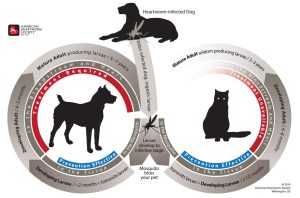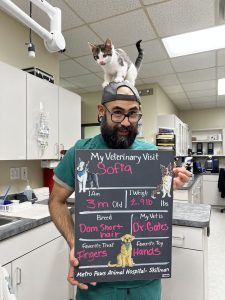Heartworm Disease and Prevention in Cats
— By Dr. Chris Campbell, DVM —
What is Heartworm Disease?
Heartworm disease is a serious but easily preventable condition that can affect several different species. While it is more often diagnosed in dogs, we do see heartworm disease in our feline companions, too. Heartworm disease is caused by worms that live in the heart and lungs. The larvae of these worms are carried by mosquitoes and spread the disease by biting animals. Once the larva is inside the new host, it will mature into an adult heartworm over the course of 6 months. Due to the prevalence of mosquitoes, heartworm disease has been diagnosed in all 50 states, and both indoor and outdoor pets are at risk.
What are the Symptoms of Feline Heartworm Disease?
Cats, unlike dogs, are an atypical host for heartworms. This means most worms will not survive to the adult stage. If worms survive to the adult stage, it is usually only a few, unlike dogs, which could harbor more than 100 live worms in severe cases. Although the adult form is uncommon in cats, the smaller immature form can still cause serious damage. In cats, heartworm disease primarily affects the lungs, which is termed heartworm-associated respiratory disease (HARD).
A cat infected with heartworms may be asymptomatic at first, but as the disease progresses, they may start to show the following symptoms:

- Coughing
- Trouble breathing
- Vomiting
- Decreased Appetite
- Weight Loss
More severe symptoms can also occur, including:
- Seizures
- Acute collapse
- Sudden death
How do you Diagnose Heartworm Disease in Cats?
Diagnosing heartworm disease can be complicated in cats since they are less likely to have adult heartworms. Diagnosing heartworm disease consists of a physical exam, specific blood tests, chest X-rays, and sometimes an ultrasound of the heart.
How do you Treat Heartworm Disease in Cats?
Unfortunately, there is no approved heartworm treatment option for cats. Therefore, the best way to stop heartworm disease in cats is to prevent it from developing. Most prevention options for cats are topical medications given once a month (or every other month, depending on the product)—these include Revolution, Bravecto Plus, or Advantage Multi, to name a few.
All cats should be on heartworm prevention, especially in our warm Texas climate, where we see mosquitoes year-round. Even indoor cats are considered at risk of heartworms since mosquitoes can enter through windows or open doors.
Please ask our veterinary team about prevention options for your cats! If you are interested in learning more about heartworms in cats, please visit the American Heartworm Society website.

